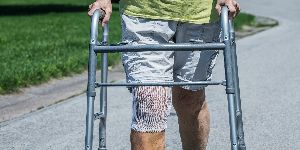
Whether you've had recent trauma or ongoing issues with your knee, when your primary care physician recommends a total knee replacement, you may be apprehensive. However, this common procedure is performed almost 800,000 times every year in the U.S. To help put your mind at ease, here are commonly asked questions surrounding knee replacement.
Frequently Asked Questions About Knee Replacement
What is a total knee replacement?
The word "knee replacement" can sound a little alarming. However, unlike its name, this surgery only removes cartilage that no longer supports the joint and not a removal of the knee as a whole. Metal alloy is inserted at the end of the femur, and a plastic spacer is placed on the tibia and knee cap to create an artificial and functioning joint.
What does the procedure entail, and how long does it take?

The surgery involves the orthopedic surgeon exposing the damaged areas of the knee through a 6- to 10-inch incision at the front of your knee. The knee cap is removed along with any damaged cartilage and tissue, along with a small amount of bone. Your new artificial joint of metal and plastic allows for maximized and pain-free movement and mobility. The surgery takes about 60 to 90 minutes, on average.
How long do new knees last?
Around 90% of total knee replacements last 10 to 15 years. However, in some cases, they do not last as long. The length of time they work for your body depends on your unique needs and lifestyle. Some people do undergo two total knee replacements in which the materials from the first surgery are replaced.
What can I expect during recovery and rehabilitation?
Patients recovering from total knee replacement surgery are up and walking within 24 hours of surgery, using a walker or crutches. Soon after, they are visited by a physical therapist to begin preliminary rehabilitation for basic movements like bending and straightening and getting out of bed. Patients are typically discharged from the hospital within two or three days and embark on several weeks of rehabilitation to gain mobility and functionality.
Under certain circumstances, your primary care physician may recommend staying at a rehabilitation care center or nursing facility for more hands-on care. However, within six weeks, you should be able to resume leisure activities without walking support. Most recover completely within three to six months.
For outstanding medical care in Monroe, LA, residents choose Affinity Health Group – Oliver Road Complex. Since 2007, this clinic has provided the community with qualified primary care physicians, family doctors, and skilled medical professionals to tend to any health concern or condition. From pediatric care to elderly care home health services, their doctors and specialists do everything they can to help improve your health and quality of life. To learn more about this dynamic clinic, visit the website. For questions or to schedule an appointment, call (318) 807-4900.
About the Business
Have a question? Ask the experts!
Send your question

